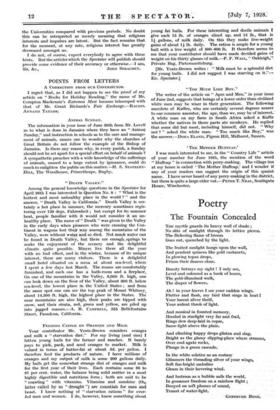POINTS FROM LETTERS
A CORRECTION FROM OUR CONTRIBUTOR.
I regret that, as I did not happen to see the proof of my article on " Books for Holiday Reading," the name of Mr. Compton Mackenzie's Extremes Meet became telescoped with that of Mr. Grant Richards's Fair Exchange.—RACIIEL ANNAND TAYLOR.
ANIMAL SUNDAY.
The information in your issue of June 30th from Mr. Lovell as to what is done in Jamaica where they have an " Animal Sunday," and instruction in schools as to the care and manage- ment of animals, causes one to wonder why the churches of Great Britain do not follow the example of the Bishop of Jamaica. Is there any reason why, in every parish, a Sunday should not be set apart for a special effort on behalf of animals ? A sympathetic preacher with a wide knowledge of the sufferings of animals, caused to a large extent by ignorance, could do much to enlighten the public on this matter.—H. S. STAVELEY- Mu., The Woodhouse, Princethorpe, Rugby.
" DEATH VALLEY."
Among the general knowledge questions in the Spectator for April 28th I was interested in Question No. 8 : " What is the hottest and most unhealthy place in the world ? " and the answer, " Death Valley in California." Death Valley is cer- tainly a hot place in summer, the mercury sometimes regis- tering over 120 degs. Fahrenheit ; but except for its summer heat, people familiar with it would not consider it an un- healthy place. The name of " Death " was given to the Valley in the early days when pioneers who were crossing the Con- tinent in wagons lost, the,* ygay among the mountains of. the Valley, were without wateT and so died. Not mu4 water can be found in Death Valley, but there are enough„springs to make the enjoyment of the scenery and the delightful climate quite possible. Miners live there the year with no bad effect, and in the winter, because of its unique interest, there are many visitors. There is a delightful small hotel situated on a mesa at about sea-level, where I spent a few days last March. The rooms are comfortably furnished, and each one has a bath-room and a fireplace. On one of the mountains in the Valley, 6,000 ft. high, one can look down on the floor of the Valley, about 300 ft. below sea-level, the lowest place in the United States ; and from the same spot one can see the top peak of Mount Whitney, about 14,500 ft. high, the highest place in the States. The near mountains are also high, their peaks are tipped with snow, and their strata, red, green and yellow, are piled up into jagged masses.—A. R. CAMPBELL, 535 Bellefontaine Street, Pasadena, California.
FEEDING CATTLE ON ORANGES AND MILK.
Your contributor Mr. Yeats-Brown considers oranges and milk a " starvation diet." For my living (and sins) I fatten young bulls for the farmer and rancher. It barely pays to pick, pack, and send oranges to market. Milk is valued in terms of butter-fat at about 5d. per gallon. I therefore feed the products of nature. I have millions of oranges and my output of milk is some 200 gallons daily. My bulls get the somewhat strange diet of oranges and milk for the first year of their lives. Each contains some 86 to 87 per cent. water, the balance being solid matter in a most highly digestible and nutritious form ; both are said to be " crawling " with vitamins Vitamins and sunshine (the latter called by us " drought ") arc essentials for man and beast. I know nothing of " starvation rations " for over- fed men and women. I do, however, know something about
young fat bulls. For these interesting and docile animals I give each 15 lb. of oranges sliced up, and 15 lb., that is 111 gallons, of milk daily. On this they make live-weight gains of about 1i lb. daily. The ration is ample for a young bull with a live weight of 500-800 lb. It therefore seems to me that your contributor should have made decided gains of weight on his thirty glasses of milk.—P. F. WALL, " Oakleigh,". Private Bag, Pietermaritzburg.
[Mr. Yeats-Brown, writes : " Milk must be a splendid diet for young bulls. I did not suggest I was starving on it."—• ED. Spectator.]
"Too MUCH LIKE BOY:'
The writer of the article on " Apes and Men," in your issue of June 2nd, suggests that beings of a lower order than civilized white men may be wiser in their generation. The following anecdote of Kaffirs, who are certainly several degrees nearer to our common ancestor, the ape, than we, may be of interest,' A white man on my farm in South Africa asked a Kaffir whether the natives in those parts ate monkeys. He replied that some did but most, including himself, did not. " Why not ? " asked the white man. " Too much like Boy," was the answer.—DoRA ELAND, Pigeon Hill, Midhurst, Sussex,.
' THE MOTHER HUFFCAP.'
I was much interested to see, in the " Country Life " article of your number for June 16th, the mention of the word " Huffcap " in connection with perry-making. The village inn at my home is called ' The Mother Huffcap,' and I wonder if any of your readers can suggest the origin of this quaint name. I have never heard of any perry-making in the district, but there is quite a large cider vat. —PETER T. NEAL, Southgate House, Winchester.












































 Previous page
Previous page